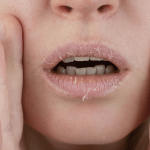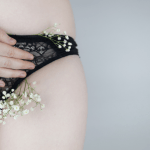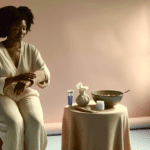Have you heard of the seven dwarfs of menopause?
The joke is that the seven dwarfs are not grumpy, dopey, doc, happy, bashful, sneezy and sleepy. Instead in menopause, they’re itchy, bitchy, sleepy, sweaty, bloated, forgetful and all dried up. And they have some aggravating cousins as well. Frigid and leaky.
Just imagine how our beloved Snow White would be as a benefactor of all these annoying menopausal dwarfs. I can imagine, and I’ll share because going through the transition of perimenopause is not an easy journey for many women and those in her orbit.
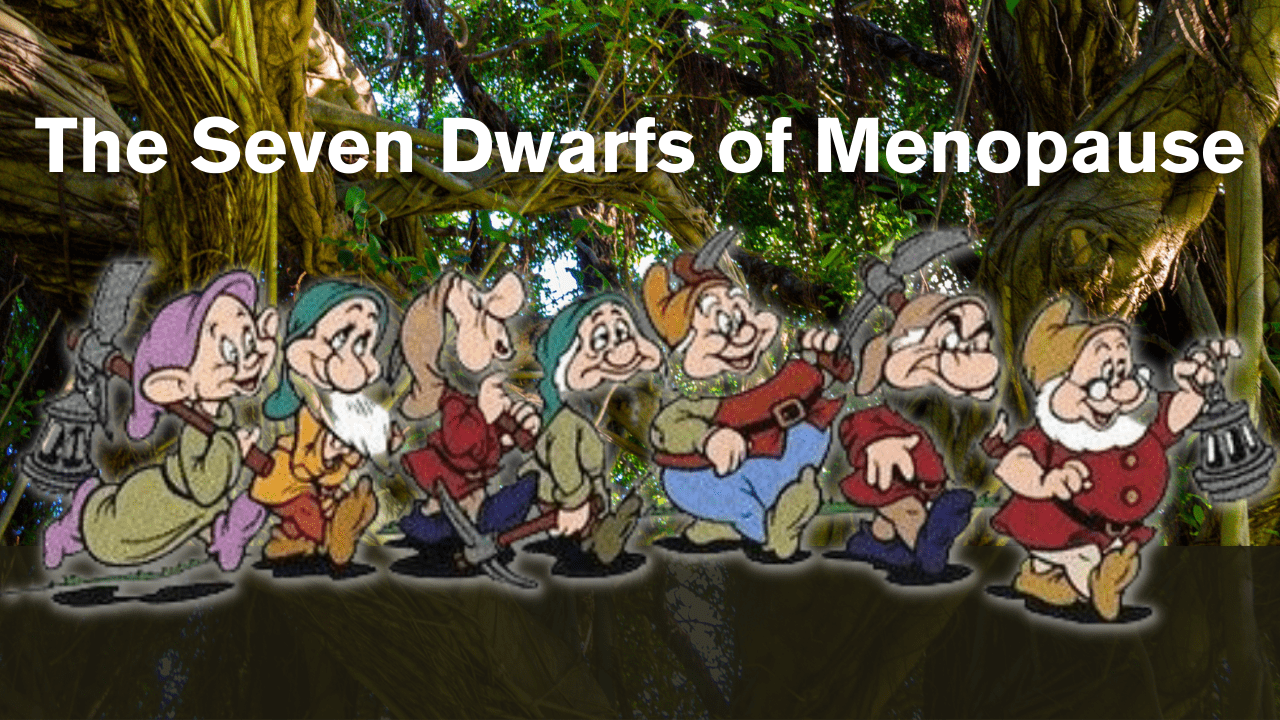
But first, let me explain menopause. Menopause is when you’re no longer have a menstrual period and your reproductive years are over. So let’s take a look at the seven dwarfs of menopause, in no particular order. Plus, they’re annoying two cousins!
The first dwarf is sweaty.
The most common symptoms here are hot flashes, a major hot. Flash can induce upper body flushing. Your skin gets hot and red, and it is accompanied by sweating. A hot flashes tend to come on rapidly and can last from 1 to 5 minutes. About 75% of women in the United States will experience hot flashes and chills after the hot flash, so these are really, really common, but they’re going to be more common as you’re a lot closer to menopause. And may stick around for up to five to seven years in post menopause. There are even cases where women experienced them for the rest of post menopause. Yikes.
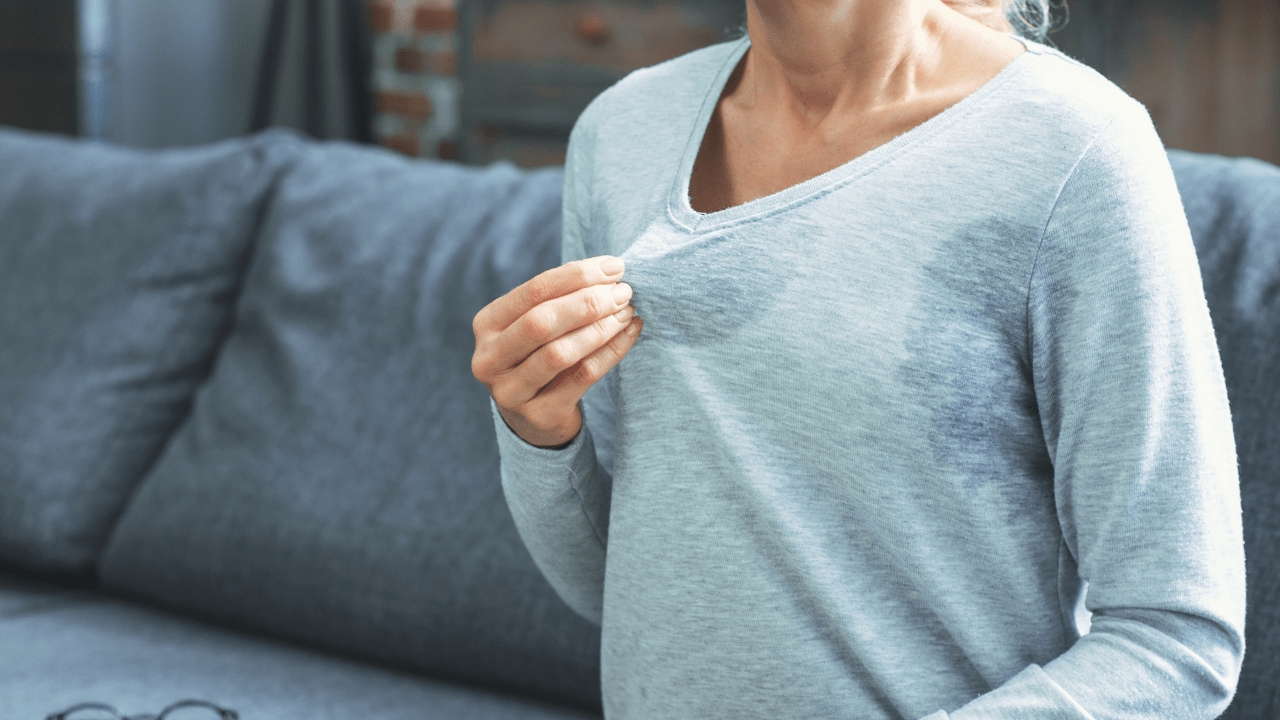
The second dwarf is sleepy.
Another common symptom is disrupted sleep. This problem is troublesome and can leave sleep deprived women fatigued and tired all the time. Not to mention irritable hot flashes can disrupt the most restorative form of sleep, women who have severe hot flashes every few hours. Are waking up through the night and soaking the bed sheets in other women. It won’t be linked at all and they’re just going to have higher rates of insomnia. One reason this may occur is because of the impact that progesterone can have on a relaxing neurotransmitter, GABA, which helps us with sleep and reduces anxiety and tension. So you can imagine if your body has less progesterone than it’s expecting, this will result in less GABA and this can disrupt sleep, particularly sleep maintenance, meaning more issues with staying asleep, rather than falling asleep.
The third dwarf is bitchy.
Put a little bit more nicely, mood disorders. This can happen with PMS, but if you find your really changing a lot, and especially if your periods are getting irregular, it’s less obvious that it’s linked to your cycles and more likely to the unpredictability of perimenopause. Women have been known to react to the slightest disagreement. Mood swings can leave one laughing one minute and crying the next. A full spectrum of emotions may abound, from feeling overwhelmed and anxious to angry and out of control rage. These changes come and go, and some women may be more vulnerable than others to hormone related changes.

The fourth dwarf is all dried up
…and this is referring to your vagina. Because of hormonal changes, the vaginal lining becomes thinner and drier and the vaginal secretions diminish. The vagina also becomes shorter and narrower, resulting in painful penetration. Vaginal dryness becomes even worse after menopause. You really start feeling different down there. Vaginal dryness effects 85% of women. What? Your skin and mucous membranes and your eyes can dry up too.

If you wonder, if this discomfort and the dryness down there will be there forever….
Try Mae. Mae is gives you back comfort, control, re-assurance, and re-connecting.
Mae is more than just a vaginal moisturizer; it’s your ally for intimate natural health, rediscovering joy, cultivating comfort, and even igniting sparks of intimacy and rekindled romance. Mae is your companion in rejoicing in your femininity at every stage of life. Learn more…
The fifth dwarf is bloaty.
The middle-aged spread and weight gain stems from a variety of factors, including the fact that older women are simply less physically active. There’s also a slowdown in metabolism, which may indicate your thyroid is off balance. And then there is the link to adrenals and cortisol levels. Day-to-day stress causes your nervous system to fire constantly and the adrenals to release cortisol. One thing that cortisol does is make us hungry and crave sweets. Things. These repeating stresses can put one in a fight flight response frequently and your body will want to store more energy just in case of an emergency. It wants a store of energy that can be broken down really quick and that one place that’s easiest to stores around the midline. This change happens with all those other hormone changes and so the weight mostly happens right around your midline.
And that brings us to the sixth dwarf, forgetful.
Many women complain of short term memory problems and difficulty concentrating during perimenopausal transition. Estrogen and progesterone are players in maintaining brain function. As we age, the brain is aging, and this we can try to prevent as much as possible by taking steps to protect our brain. So if you think about women who’ve been pregnant and that pregnancy brain and all those changes and how your brain works, they’re all linked to hormones. This is another period in life where those hormone changes can really affect how well your brain is working.

Itchy is the seventh dwarf.
Itchy skin or pruritus is a common problem during menopause. Many women may notice itchiness on their body, face or genitals. Itchy skin during menopause may be the result of a fallen estrogen levels. Estrogen is important for skin health. It helps the skin to stay moist by stimulating the production of natural oils and collagen. Collagen is a protein that maintains the strength and elasticity of the skin. A decrease in natural oils and. Collagen can cause the skin to become drier and thinner than it was before menopause, which can make it feel itchy. Women may also notice vaginal itching more often during menopause. Vaginal itching is called vulvar peridis. This type of itching may occur more often if a woman also experiences vaginal dryness, which is another common symptom of menopause. Low levels of estrogen can make the vaginal tissue drier and thinner than usual. When this happens, it’s called vaginal atrophy, or atrophic. Vaginitis, which can make the vagina or vulva feel itchy and painful as well. It may also make sex more painful.
So those are the seven dwarfs of menopause, and now they’re annoying cousins, frigid and leaky.
The first cousin is frigid.
Another one that we’re not going to be really happy about is changes in sex drive. Slow sexual desire is very common in menopause. Sex drive or libido may decline at midlife for a variety of reasons. Diminished estrogen or age-related changes in circulation may reduce blood flow to the genitals and cause a decrease in sensation. Vaginal dryness or thinning we mentioned can make intercourse painful. Women who have sleep problems may be too fatigued to be interested in sex. And if you’re hot flashing, you may be sensitive to heat and do not want to be touched. Gone are the nice tender moments of cuddling. So if you find your libidos going out the window, this is probably what’s going on.
Then there’s the second cousin… leaky!
Incontinence is common. Women are suddenly going to notice they have some leakage when they cough, laugh a lot, and jump when exercising. Muscle weakness caused by aging or injuries during childbirth, and even prescription medication can contribute. Decreased estrogen may cause thinning in the lining of the urethra, the tube that empties the urine from the bladder. Problems may include a frequent need to urinate, a sudden urge to urinate even though your bladder is not full, and the need to urinate more often during the night.
If you’re experiencing these things and are wishing that a huntsman will come and finish you off in the forest (a little Snow White humor ha ha) you’re not alone. We are here to help. We’ll do another video to give you more ideas and stuff you could do to help ride out all of these changes that are happening in your life for now.
If you want to do anything to help ease the load and ride out this transitional stage, you can remove any potential endocrine disruptors as I mentioned earlier. They are toxic and contribute to the mayhem. Make sure your femcare products and skin care are 100% all natural and chemical free. So please leave comments below.
So… which dwarf is annoying you the most? Which one do you want to kick out of the garden?
Comment below!
Itchy & Dry?
If you are looking for help with the dwarfs Itchy and All Dried up, check out these two products. We have received a lot of feedback from women that they were very helpful – even life savers!

From unhappy, dry, and sandpaper to silky, smooth and feeling good. That’s Cleo. Cleo is a 100% natural labial balm to moisture and soothe “your other lips”. Cleo is chemical-free, water-free, pH optimized and helps maintain and restore your delicate labial skin’s natural flora. Ideal for daily use or as needed. Get the most silky, lovable lips ever.
Recommended by Health Care Professionals. Loved by thousands of women who got their life back.



